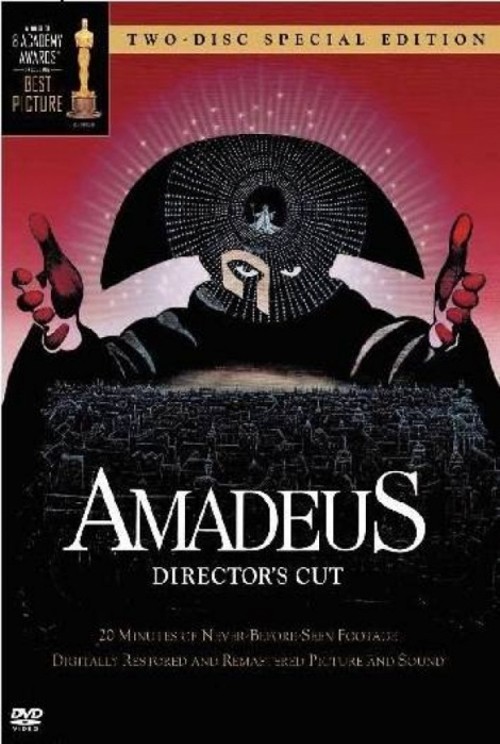I love classical movies. That’s right, not classic movies: classical movies. September is Classical Music Month, the origin of which probably ties in to the whole “back to school, back to seriousness” idea. Which is sort of silly, actually—just because classical music has stood the test of time doesn’t mean it has to be solemn.
In fact, for most Americans under 60, our first exposure to classical music probably came in Bugs Bunny cartoons such as 1957’s “What’s Opera, Doc?” in which Bugs and Elmer Fudd send up Wagnerian opera in gloriously comic style. (It’s available in the DVD set Looney Tunes Golden Collection: Volume 2.) We knew Gioachino Rossini’s “William Tell Overture” as the theme to the 1950s The Lone Ranger TV series starring Clayton Moore (also available on DVD), and that association has lingered even in the long absence of the character from TV or film. And generations of American kids likely first heard Johann Sebastian Bach’s Toccata and Fugue in D Minor, Pyotr Ilyich Tchaikovsky’s Nutcracker Suite, and other classical pieces in Fantasia, the 1940 Disney film that enjoyed regular theatrical re-releases up through the 1970s—and, one hopes, today’s kids are seeing the film on DVD.
Classical music has gotten connected to goofy grown-up stuff, too. The Marx Brothers spent A Night at the Opera for their 1935 film, which revolves around a production of Pagliacci and features a slew of songs from Il Trovatore. And the John Philip Sousa march “The Liberty Bell” will likely never escape the air of insanity it acquired when Monty Python chose it as the theme music for its Flying Circus sketch-comedy series (which is available in its entirety on DVD). The 1977 Italian film Allegro Non Troppo is perhaps more unsettling than goofy: a parody of Fantasia, it combines selections form Debussy, Vivaldi, Stravinsky and other great composers with psychedelic animation that is definitely not meant for kids.
Perhaps in defiant resistance to the strange-but-common notion among nonfans of classical music that it is somehow “nice” or “boring,” filmmakers have frequently linked classical compositions to disturbing, violent, or otherwise less than pleasant imagery. Lots of classical compositions have been appropriated by horror films—or, more frequently, by the makers of horror-film trailers—but few films have ever come as close to making a piece of classical music as dark and distressing as Apocalypse Now does for Richard Wagner’s “Ride of the Valkyries.” Unless it’s 1971’s A Clockwork Orange, which turns Beethoven’s Ninth Symphony into a weapon to be used against its antihero, Alex.
Compared to those flicks, 1968’s 2001: A Space Odyssey—also from Orange director Stanley Kubrick—is downright pastoral in its usage of classical music in the unexpected setting of space. Johann Strauss Jr.’s “Blue Danube” and Richard Strauss’s (no relation) “Also Sprach Zarathustra” are so connected to the movie’s majestic imagery that it’s easy to imagine that some lovers of the film don’t realize the music wasn’t written specifically for it.
Movies about the people who play classical music abound, such as 1999’s Music of the Heart, starring Meryl Streep as an inner-city schoolteacher who introduces her students to the joys of the violin; 1996’s Shine, featuring Geoffrey Rush as a classical pianist struggling with mental illness; and this year’s The Soloist, just out on DVD, in which Robert Downey Jr.’s Los Angeles journalist befriends a homeless man (Jamie Foxx), who just happens to be a highly gifted classical bassist. But there have been surprisingly few films about the great composers themselves. There’s Immortal Beloved, from 1994, starring Gary Oldman as Ludwig van Beethoven, but it pales in comparison to Amadeus. The Best Picture Oscar-winner and one of the American Film Institute’s 100 greatest films, Amadeus also celebrates the 25th anniversary of its release this month. Perhaps not until the overwhelming shadow of Amadeus—and Tom Hulce’s iconic performance as the composer—recedes will we see another film that even attempts to capture such genius.
Speaking of Other A&E
-
Discovering Zion
Kick back or get active in the red rocks
- Jun 10, 2013
-
Seven Poems & Seven Paintings: Joel Long & Dave Hall
Light As Words: Poet Joel Long and painter Dave Hall showcase a unique artistic collaboration.
- Mar 31, 2010
-
Scary Halloween Movies
Creep Shows: A few Halloween movie suggestions for genuine heebie-jeebie moments.
- Oct 21, 2009
- More »
More by MaryAnn Johanson
-
Feature movie review: Society of the Snow
A new adaptation finds new power in a 50-year-old event.
- Jan 3, 2024
-
Film Reviews: New Releases for Dec. 8
The Boy and the Heron, Maestro, Eileen, Leave the World Behind
- Dec 7, 2023
-
Feature movie review: MAESTRO
Bradley Cooper's Leonard Bernstein biopic avoids cliché and offers electrifying audacity
- Dec 6, 2023
- More »
Latest in Arts & Entertainment
Readers also liked…
-
New TV for January 2023
Mayfair Witches, Velma, The Last of Us, Poker Face and more premieres
- Jan 4, 2023



